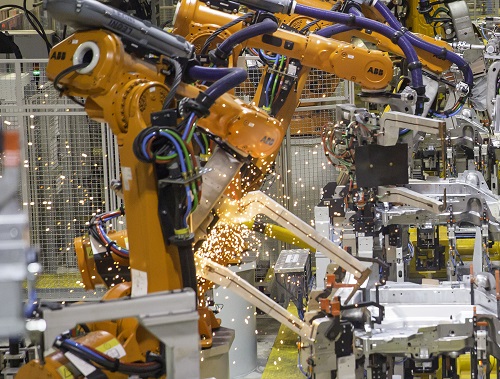
Forecasters disagree over whether the coming wave of robotic automation will usher in a utopia or a wasteland, but none questions a future where automotons increasingly put human beings out of work. “What Jobs Will Still be Around in 20 Years?” asks the Guardian. “The Future Has Lots of Robots, Few Jobs for Humans,” Wired forecast. Robots and artificial intelligence will take up to 38 percent of all jobs in the United States and 30 to 35 percent of jobs in the EU, according to figures released earlier this year by PwC.
Prognosticators agree that machines will meet an ever-growing share of man’s needs and desires, while homo sapiens retreat into forced idleness. The optimists believe this will free humans to devote hone their higher, God-given faculties. Pessimists worry that a significant portion of the human race will lose its economic wherewithal, as fewer jobs are open to people.
“Fortunately, this brave new world of idleness and leisure is a chimera. It will never come to pass,” writes Peter Smith in a new essay for Religion & Liberty Transatlantic. The world will never see a future in which shiftless people relax while robots create more products than they can ever afford, he writes, in “Robots will not create a workless world.” Scarcity and human nature will assure economic activity continues:
Superabundance is unachievable in this earthly realm. Poverty to one degree or another will always be around. “For you have the poor with you always,” Jesus said (Matthew 26:11). This truth is borne out by the existence of ingrained poverty within all wealthy nations. But, poverty aside, people will never be satisfied with what they have, even those living well in the West. Witness ever-growing credit card debt.
The automation of existing production will do what it has always done. It will create the conditions for the development of new products, for new demands, and for new, different and well-paying jobs to emerge.
The twenty-first century differs from the three previous business revolutions (which he describes in his article). The heavy hand of government will press on the scales, Smith warns:
Artificial intelligence, robotics, 3-D printing, nanotechnology, biotechnology, and the like, are disruptive technological changes. … Such changes always result in unemployment in some areas, for some time. An exacerbating factor this time around is that we have more onerous regulatory regimes in place across labour and product markets than in past eras. These reduce market flexibility, which allows wages to fall; some businesses to downsize, and others to develop and expand, free of costly and time-consuming obstacles. Such flexibility mitigates the effect of technological change in generating transitory unemployment.
Smith describes the process of automation, how the free market brings balance to the economy, and why an automated world will only change human work patterns in detail.
You can read his full essay here.
(Photo credit: Land Rover MENA. This photo has been cropped. CC BY 2.0.)

